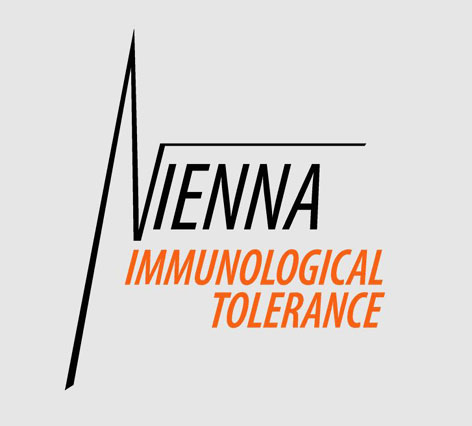
MECHANISMS OF ESTABLISHMENT AND MAINTENANCE OF IMMUNOLOGICAL TOLERANCE
SFB-F23 A SPEZIALFORSCHUNGSBEREICH FUNDED BY THE FWF
 |
MECHANISMS OF ESTABLISHMENT AND MAINTENANCE OF IMMUNOLOGICAL TOLERANCESFB-F23 A SPEZIALFORSCHUNGSBEREICH FUNDED BY THE FWF |
MEMBERS Wilfried Ellmeier |
Herbert Strobl
Institute of Immunology
OE Clinical Institute of Hygiene and Medical Microbiology
Medical University of Vienna
Lazarettgasse 19
1090 Wien
AUSTRIA

Tel.: +43-1-40160-65001
Fax: +43-1-40160-965006
herbert.strobl@meduniwien.ac.at
http://www.immunology.at
TGF-beta1 polarized epithelial Langerhans type dendritic cells: a candidate tolerogenic DC subset
SFB co-workers: Barbara Platzer (postdoctoral fellow); Peter Reisner (PhD student)
Epithelial Langerhans cells (LCs) are the environmentally exposed outposts of the immune system. They specifically reside in epithelial/mucosal tissues. LCs undergo slow turn-over under steady state conditions, and recent evidence suggests that they might play a critical role in tolerance induction and maintenance to environmental and epithelial antigens. Previous studies revealed that LCs are specialized DCs that differ from other myeloid or DC family members in their dependency on certain transcriptional processes. Understanding the molecular mechanisms of how they develop from precursors may lead to novel strategies to specifically interfere with LC function in vivo or to improve current protocols to generate these cells ex vivo for immunotherapy.
In our SFB project we aim at characterizing the transcriptional processes that regulate LC differentiation. We have established an in vitro model to study LC lineage commitment from putative shared LC/monocyte precursors. In this model, addition of the cytokine TGF-beta1 is both required and sufficient to induce LC commitment. This in vitro system models the in vivo situtation, given that epithelial TGF-beta1 similarly iis required for LC generation from their precursors. Furthermore, since TGF-beta1-induced LCs generated in vitro resemble immature LCs in vivo, we will test the hypothesis that they might exert a tolerogenic function.